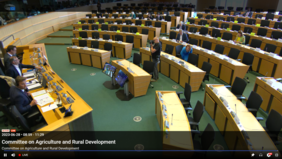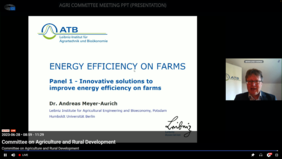How can energy efficiency in agriculture be improved? A public hearing on this question was held today in the Committee on Agriculture and Rural Development (AGRI) of the European Parliament, to which the scientist Dr. Andreas Meyer-Aurich, Group Leader Economics of Technologies in Agriculture at ATB, was also invited. At ATB, Dr. Meyer-Aurich mainly works on economic analyses of innovations in agriculture and examines greenhouse gas avoidance strategies.
In his presentation, he made clear that the provision of food to EU citizens accounts for a proportion of the overall energy consumption in the EU, at 26% of total final energy.
The main drivers of energy consumption are found in agricultural crop cultivation and here mainly in form of indirect emissions, particularly from synthetic nitrogen fertilizers, which account for 50% of the energy consumption, followed by diesel fuel consumption, drying, cooling, and storage.
Feeding plant products to animals results in lower energy efficiency for the animal products: from one unit of energy used, only about 10-20% of the energy input is converted into animal products compared to plant production. The primary energy inputs are related to feed, as well as heating, cooling, and energy for feed provision.
Innovations can help improve the energy efficiency of agriculture. The most effective approaches include more efficient use of nitrogen fertilizers or the energetic utilization of waste streams from livestock farming. Additionally, optimizations in storage, drying, and cooling can contribute to more efficient energy use.
Innovations in digital technologies and robotics can, for example, reduce diesel consumption through lighter construction or the use of alternative energy resources. And precision farming, such as specific fertilisation of partial areas, can also make a contribution. Further potential is offered by the use of agri-photovoltaics or diesel substitutes, e.g. in the form of biogas.
However, for nitrogen fertilization, it has been shown that modern methods of site-specific fertilization have only limited potential for increasing efficiency. In particular, the acceptance of the technology among farmers is limited, and fertilizer algorithms usually do not consider prices. When fertilizer prices are high and weather conditions are uncertain, reduced fertilization contributes to higher energy efficiency and often proves to be economically advantageous.
All these fields are important parameters for further improving energy efficiency in agriculture. However, Dr. Meyer-Aurich also made it clear that appropriate political control is necessary to drive this forward.
In the discussion with the committee members, the question was addressed to what extent so-called green ammonia from renewable energies could improve energy efficiency. Dr Meyer-Aurich said that it makes more sense from an energy point of view to use green ammonia for the production of fertiliser than to crack it at great expense and separate the individual components hydrogen and nitrogen from the ammonium. In any case, the fertiliser would be more expensive than conventional nitrogen fertiliser, meaning that potential savings in fertiliser use would continue to be of significance.
Claudia Canevari, Head of Unit "Energy Efficiency: Policy and Financing" of the EU Commission, emphasised at the end that energy efficiency is not about integrating all forms of renewable energy into agricultural systems, but about increasing energy efficiency in the production of agricultural products in order to develop resilient agricultural systems in the long term.
To re-listen:


